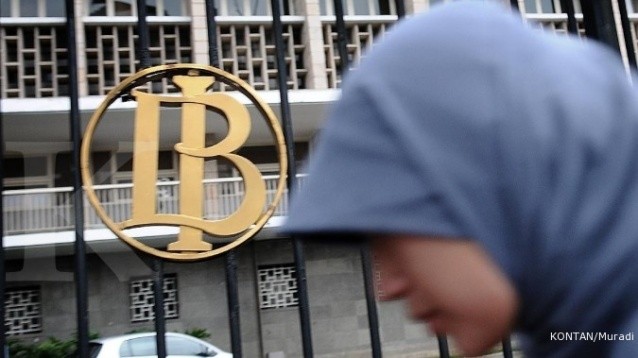Popular Reads
Top Results
Can't find what you're looking for?
View all search resultsPopular Reads
Top Results
Can't find what you're looking for?
View all search resultsIslamic banking a gloomy industry
Following its birth in the early 1990s, Indonesia’s Islamic banking industry grew tremendously in the first two decades.This industry seemed a very promising portfolio addition for investors, because it was resilient enough to withstand two severe financial crises, namely the Asian financial crisis in 1998 and the global financial crisis in 2008.
Change text size
Gift Premium Articles
to Anyone
Following its birth in the early 1990s, Indonesia’s Islamic banking industry grew tremendously in the first two decades.
This industry seemed a very promising portfolio addition for investors, because it was resilient enough to withstand two severe financial crises, namely the Asian financial crisis in 1998 and the global financial crisis in 2008. That indicated that this industry could play a role as an alternative for both the Indonesian and global financial market.
However, in the last few years, the industry displayed a poor performance. The recent rise in non-performing financings (NPF — equivalent to non-performing loans or NPL at conventional banks), across Indonesia’s Islamic banks shows that the industry is in deep trouble.
Although the latest industry data show a slight decline in the NPF rate to 4.8 percent — just below the permissible level of 5 percent — the NPF had risen noticeably since September 2014, crawling up to above 5 percent. The industry’s NPF reached the highest level in May 2016 at 6.2 percent, the worst level since at least 2003.
In September 2016, six of 13 Islamic banks had an NPF rate exceeding the regulatory limit set by the Indonesian central bank, Bank Indonesia (BI).
Three of these six banks had terrible NPF rates at more than double the regulatory limit, with one even recording a rate of more than 30 percent.
There are two key reasons for the significant decline of Indonesia’s Islamic banking industry. The first reason relates to the supply side in that there are no genuine Islamic products.
Most Islamic finance products are pretty similar to conventional financial products. How could this happen?
Islamic financial products are frequently created by mimicking or mirroring (copy-pasting) conventional products. For example, in practice, the murabahah (mark-up sale scheme) is considered to be pretty similar to conventional credit products, despite being different in theory. Many people think that the so-called “margin rate” used by Islamic banks is substantially the same as the “interest rate” used by conventional lenders.
On the other hand, profit-loss sharing schemes (mudharabah and musharakah), which are the ideal Islamic financing schemes, are nearly impossible to implement due to their very risky nature (high-risk, low-return). As a consequence, these schemes are unattractive not only for Islamic banks, but also for their customers. It is therefore no wonder that murabahah dominates the industry’s financing portfolio in Indonesia, accounting for more than 90 percent of Islamic banks’ financing portfolios, while musharakah and mudharabah together account for less than 2 percent. Ironically, murabahah has been the main contributor to high NPFs (more than 50 percent), followed by musharakah (30 percent) and mudharabah (less than 5 percent).
The second reason pertains to the demand side as people respond to the mimicking/mirroring practice in Islamic financial products. Many people believe that Islamic and conventional financial products are almost the same, with no substantial differences between the two.
This has reduced their trust in the purity of Islamic banks. Unsurprisingly, therefore, people think rationally and prefer the conventional products to the Islamic ones due to the higher returns. This argument is supported by a study by Yuniarti (2015), confirming that the main problem of Islamic banking in Indonesia stems not from the demand side (consumers). The study shows that consumers, particularly religious people, have high expectations about Islamic finance. They strongly believe that the Islamic banking industry has a bright future and could be an alternative for their financial portfolio.
This supports the argument that the problem is more likely on the supply side.
Therefore, the industry should meet people’s expectations by providing genuine and beneficial products and showing good performance; otherwise it will create great distrust among these loyal customers.
At more than 20 years of age, Indonesia’s Islamic banking industry should be independent and able to create genuine products, rather than mirroring/mimicking conventional finance.
The only way to save Islamic banking in Indonesia is by ensuring that the industry develops genuine and innovative products. Otherwise, the industry is just digging its own grave.
The industry must maintain consumers’ trust by continuously improving its products to be purely Islamic products, as well as improving internal aspects, such as risk management, human capital and corporate governance.
In addition, the relevant authorities (the government, BI, the Financial Services Authority) are supposed to create supportive regulations and an appropriate strategy to solve the industry’s challenges in the short run (such as the NPF problem), as well as in the medium to long run, such as developing the financial infrastructure, issuing effective regulations, etc.
These are a few steps we need to take if we want to rejuvenate and transform Islamic banking from a gloomy industry to a brighter and stronger one.
---------------
We are looking for information, opinions, and in-depth analysis from experts or scholars in a variety of fields. We choose articles based on facts or opinions about general news, as well as quality analysis and commentary about Indonesia or international events. Send your piece to community@jakpost.com. For more information, click here.










